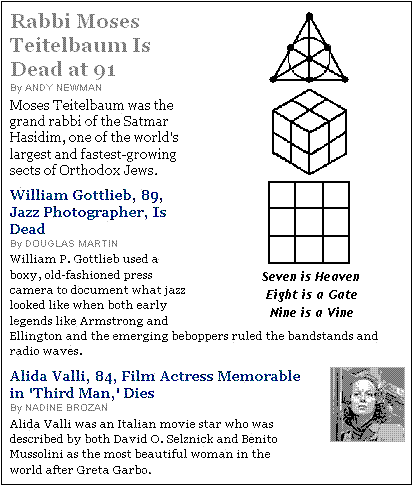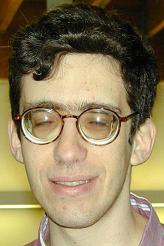to Sunday Morning
| John Kenneth Galbraith died last evening at 9:15 PM in Cambridge, Mass., according to news reports. Related material: Plato, Pegasus, and the Evening Star, Time in the Rock. |
 Brian Snyder/Reuters
Galbraith |
| John Kenneth Galbraith died last evening at 9:15 PM in Cambridge, Mass., according to news reports. Related material: Plato, Pegasus, and the Evening Star, Time in the Rock. |
 Brian Snyder/Reuters
Galbraith |
Harvard mathematician
George Mackey
The five Log24 entries ending at
7:00 PM on March 14, 2006,
the last day of Mackey’s life:
“Some of America’s most promising youth are seeking an even higher education.”
— Touchstone: A Journal of Mere Christianity
Exercise
Review the concepts of integritas, consonantia, and claritas in Aquinas:
"For in respect to beauty three things are essential: first of all, integrity or completeness, since beings deprived of wholeness are on this score ugly; and [secondly] a certain required design, or patterned structure; and finally a certain splendor, inasmuch as things are called beautiful which have a certain 'blaze of being' about them…."
— Summa Theologiae Sancti Thomae Aquinatis, I, q. 39, a. 8, as translated by William T. Noon, S.J., in Joyce and Aquinas, Yale University Press, 1957
Review the following three publications cited in a note of April 28, 1985 (21 years ago today):
(1) Cameron, P. J.,
Parallelisms of Complete Designs,
Cambridge University Press, 1976.
(2) Conwell, G. M.,
The 3-space PG(3,2) and its group,
Ann. of Math. 11 (1910) 60-76.
(3) Curtis, R. T.,
A new combinatorial approach to M24,
Math. Proc. Camb. Phil. Soc.
79 (1976) 25-42.
Discuss how the sextet parallelism in (1) illustrates integritas, how the Conwell correspondence in (2) illustrates consonantia, and how the Miracle Octad Generator in (3) illustrates claritas.
Poetry Month, continued
A partial answer:
Yesterday's Pennsylvania Lottery evening number was 432.
Poets and others who seek meaning in random numbers may, if they wish, consult page 432 of The Collected Poems of Wallace Stevens. They may also, having studied the Log24 entries of Holy Saturday (April 15, 2006), consult page 432 of A Flag For Sunrise.
Those who prefer the dictionary method of interpreting random numbers may consult page 432 of Webster's New World Dictionary, College Edition of 1960. This page has a special meaning for those aware that Aslan's How is "home to the deepest magic Narnia has ever known." (Everything2.com)
The Blue Buildings
in the Summer Air
by Wallace Stevens
(Collected Poems, pp. 216-217)
I.
Cotton Mather died when I was a boy. The books
He read, all day, all night and all the nights,
Had got him nowhere. There was always the doubt,
That made him preach the louder, long for a church
In which his voice would roll its cadences,
After the sermon, to quiet that mouse in the wall.
II.
Over wooden Boston, the sparkling Byzantine
Was everything that Cotton Mather was
And more. Yet the eminent thunder from the mouse,
The grinding in the arches of the church,
The plaster dropping, even dripping, down,
The mouse, the moss, the woman on the shore…
III.
If the mouse should swallow the steeple, in its
time…
It was a theologian’s needle, much
Too sharp for that. The shore, the sea, the sun,
Their brilliance through the lattices, crippled
The chandeliers, their morning glazes spread
In opal blobs along the walls and floor.
IV.
Look down now, Cotton Mather, from the blank.
Was heaven where you thought? It must be there.
It must be where you think it is, in the light
On bed-clothes, in an apple on a plate.
It is the honey-comb of the seeing man.
It is the leaf the bird brings back to the boat.
V.
Go, mouse, go nibble at Lenin in his tomb.
Are you not le plus pur, you ancient one?
Cut summer down to find the honey-comb.
You are one… Go hunt for honey in his hair.
You are one of the not-numberable mice
Searching all day, all night, for the honey-comb.
From today’s online
Harvard Crimson:

From an Amazon.com review
of McCafferty’s latest book:
— and an entry of April 8
that contains the following
“kind of cross” —
3 PM
Good
Friday

“‘Lestat,’ the maiden Broadway production of Warner Brothers Theater Ventures, is the third vampire musical to open in the last few years, and it seems unlikely to break the solemn curse that has plagued the genre. Directed by Robert Jess Roth from a book by Linda Woolverton, the show admittedly has higher aspirations and (marginally) higher production values than the kitschy ‘Dance of the Vampires’ (2002) and the leaden ‘Dracula: The Musical’ (2004), both major-league flops.” — Ben Brantley
See Log24,
St. Patrick’s Day 2004:
“I faced myself that day with
the nonplused apprehension
of someone who has
come across a vampire
and has no crucifix in hand.”
— Joan Didion, “On Self-Respect,”
in Slouching Towards Bethlehem
“For every kind of vampire,
there is a kind of cross.”
— Thomas Pynchon,
Gravity’s Rainbow

See also
Plagiarist or Fraud?
The weekly Harvard Independent points out that Kaavya Viswanathan’s recent novel may have been ghostwritten. Therefore the ghostwriter, rather than the purported author, may have committed the original plagiarism. Viswanathan maintains that she herself wrote the novel, and said that “any phrasing similarities… were completely unintentional and unconscious.” (Harvard Crimson, April 24) (The use of ghostwriters is not generally called plagiarism, although one definition says plagiarism is “passing off someone else’s work as your own.” This would of course make all recent U.S. presidents guilty of the crime.)
Related material:
“There is a pleasantly discursive treatment
of Pontius Pilate’s unanswered question
‘What is truth?'”
— H. S. M. Coxeter, 1987, introduction to
Richard J. Trudeau’s remarks on
the “Story Theory” of truth
as opposed to
the “Diamond Theory” of truth
in The Non-Euclidean Revolution
A Serious Position
“‘Teitelbaum,’ in German,
is ‘date palm.'”
— Generations, Jan. 2003
“In Hasidism, a mystical brand
of Orthodox Judaism, the grand rabbi
is revered as a kinglike link to God….”
— Today’s New York Times obituary
of Rabbi Moses Teitelbaum,
who died on April 24, 2006
(Easter Monday in the
Orthodox Church)
From Wikipedia, an unsigned story:
“In 1923 Alfred Teitelbaum and his brother Wacław changed their surnames to Tarski, a name they invented because it sounded very Polish, was simple to spell and pronounce, and was unused. (Years later, he met another Alfred Tarski in northern California.) The Tarski brothers also converted to Roman Catholicism, the national religion of the Poles. Alfred did so, even though he was an avowed atheist, because he was about to finish his Ph.D. and correctly anticipated that it would be difficult for a Jew to obtain a serious position in the new Polish university system.”

(For Rebecca Goldstein of Trinity College)

Sources: today's New York Times
and the five Log24 entries ending
on the morning of April 7, 2006:
ART WARS
in Poetry Month
Of what use the above trinity
might be to Rebecca, I am unsure.
I find it helpful in traveling back to
a summer night on 52nd St. in 1948…

continued from
Saturday, April 22
Finis
Opus

Sweet Little Sixteen
She's just got to have
About half a million
Famed autographs…

www.davidgregharth.com/press/article_38.html
Her wallet's filled with pictures
She gets 'em one by one
— After Chuck Berry, 1958
"We are all Paris Hilton now."
— Ana Marie Cox,
Sweet 16 and Spoiled Rotten,
in TIME Magazine,
the April 24 Opus Dei issue
Related material
in the Harvard Crimson:
The $500,000 sophomore’s
debut novel is on the shelf…
But is it a gift or a curse?
Publisher 'Certain' of
'Literal Copying' in
Sophomore's Novel

Harvard student
From the novel How Opal Mehta Got Kissed, Got Wild, and Got A Life, excerpt in USA Today:
“If our incoming student body is capable only of immersing themselves in book learning, then I’m not doing my job.”
— The Harvard Dean of Admissions
From The Elements of Style, by William Strunk, Jr., 1918:
Student body. A needless and awkward expression, meaning no more than the simple word students.
They. A common inaccuracy is the use of the plural pronoun when the antecedent is a distributive expression such as each, each one, everybody, every one, many a man, which, though implying more than one person, requires the pronoun to be in the singular. Similar to this, but with even less justification, is the use of the plural pronoun with the antecedent anybody, any one, somebody, some one, the intention being either to avoid the awkward “he or she,” or to avoid committing oneself to either. Some bashful speakers even say, “A friend of mine told me that they, etc.”
Related material in today’s Harvard Crimson:
Student’s Novel Faces Plagiarism Controversy.
Also of interest:
This “may be the only chick-lit novel with a subplot that involves solving a famous math theorem.”
|
See also parts 1-7:
|
| Sweet Little Sixteen She’s got the grown-up blues Tight dresses and lipstick She’s sportin’ high-heel shoes Oh but tomorrow morning She’ll have to change her trend And be sweet sixteen And back in class again — Chuck Berry, 1958 |
Back in
Sunday School Class:
“Send magazines!”–
Flora Poste in
Cold Comfort Farm
in today’s
New York Times:
“… a spate of sex magazines…
emerge on elite campuses….”
“We are all Paris Hilton now.”
— Ana Marie Cox,
Sweet 16 and Spoiled Rotten,
in TIME Magazine,
the April 24 Opus Dei issue

“Or perhaps not.”
— Flora Poste in
Cold Comfort Farm
Revisited
Today is
Shakespeare’s birthday.
In his honor, a death
from April 9:
George C. Minden, 85, Dies;
Led a Cold War of Words.
“Send magazines!”
— Kate Beckinsale
as Flora Poste

See the essay
by Ana Marie Cox
on the final page
of this week's
TIME magazine.
Related material:
Jung and the Imago Dei,
Log24 entries of Feb. 20, 2004,
Space, Time, and Scarlett, and
Crystal's Sweet Sixteen
(Saturday Night Live sketch
starring Scarlett Johansson–
also featured as the clerk in
"Once in a Lifetime Jewelers"–
broadcast on Jan. 14, 2006.)

"Her wall is filled with pictures,
She gets 'em one by one."
Department of Defense
(Found in Translation continued,
Lust und Freud continued, and
Here’s Donny continued)
“When a person has uncomfortable thoughts or feelings, they may project these onto other people, assigning the thoughts or feelings that they need to repress to a convenient alternative target….
Projection is one of Freud’s original defense mechanisms.”

The portrait at right is from
“Donny’s Ramblings:
Diary of a Pornographer.”
Also from that diary —
“This is the evening when
yours truly, your friendly
neighborhood pornographer,
becomes your next hope
for American Idol success….”
“Sound familiar?”
“I’m the decider.”
Headline in tonight's
online New York Times:
Here's Donny!
In His Defense,
a Show Is Born
1. Log24 entries of Good Friday
through Easter Monday,
especially this link
"Tonight is Karaoke night at one of our local sports bars. This is the evening when yours truly, your friendly neighborhood pornographer, becomes your next hope for American Idol success…."
"Little Red Ridin' Hood,
You sure are lookin' good…"
Piedra y Luz
This morning's New York Times tells of Philip J. Hyde, wilderness photographer, who died on March 30. The following, taken from the website Sister Earth, is in his honor.
Cierra los ojos y oye cantar la luz:
El mediodía anida en tu tímpanoCierra los ojos y ábrelos:
No hay nadie ni siquiera tú mismo
Lo que no es piedra es luz
Close your eyes and hear
the song of the light:
Noon takes shelter in your inner earClose your eyes and open them:
There is nobody not even yourself
Whatever is not stone is light
(From "Piedra Nativa," by Octavio Paz, quoted in the Sierra Club book Baja California and the Geography of Hope, by Joseph Wood Krutch and Eliot Porter.)
Related material:
"Last Words," from the
date of Hyde's death, and
"Arrow in the Blue,"
from Sept. 5, 2002.
Sub Specie Aeternitatis
"Pynchon's mind is the steel trap
of American literature."
— Lorrie Moore, from
a page linked to in
"Eternal," an entry
of April 12
Related material:
A Hollywood Easter
Part I:
Good Friday morning
Hollywood turns to divine inspiration
Updated 4/14/2006 9:55 AM ET
Inspired by box-office smashes such as The Passion of the Christ and The Chronicles of Narnia: The Lion, the Witch and the Wardrobe, studios are not only casting an eye to more religious-themed stories, but they’re also marketing movies more aggressively than ever to churchgoers.
Part II:
Good Friday afternoon
Log24, 3 PM Good Friday, 2006.
Part III:
Easter in Hollywood
Latest “Scary” spoof leads box office
Sun Apr 16, 2006 8:02 PM ET
By Dean Goodman
LOS ANGELES (Reuters) – The joke may be wearing a little thin for critics but the fourth installment of the “Scary Movie” spoof franchise managed to open atop the weekend box office in North America with sizable ticket sales.
According to studio estimates issued on Sunday, “Scary Movie 4” earned $41.0 million in the three days beginning April 14, setting a new record for the Easter weekend.
Part IV: Now
Blog search for SubSpecies23.
Easter Conundrum:
Three Days, Three Nights?
One of Christianity’s many internal contradictions is as follows:
Jesus supposedly said he would be in the tomb for “three days and three nights,” yet most Christians accept without question the story that he died on a Friday afternoon and rose on the following Sunday morning.
I was surprised to find this afternoon that at least one subdivision of the Jesus cult has found an ingenious way around this difficulty. The United Church of God (an offshoot of the sect founded by Herbert W. Armstrong) argues that Jesus died on a Wednesday afternoon (just before Passover) and rose on a Saturday afternoon. I do not recommend any of the subdivisions of the Jesus cult, but this one has at least managed to construct an intelligent argument.
For details, see The Good Friday – Easter Sunday Question.
More bookmarks, in the spirit of
Hemingway rather than Fitzgerald,
from the date of Kellogg's death–
New York State lottery
on April 6, 2006:
Mid-day: 338
Evening: 323
From A Flag for Sunrise, page 338:
"She seemed, superficially, to have
thrown every grain of her energy
into the driving…. She was stone
beautiful, he thought; to his eye
outrageously and provocatively
beautiful…."
|
Related material:
Compare with Grace Kelly driving
Cary Grant in "To Catch a Thief" and Frank Sinatra in "High Society." |
Those who prefer a different sort
of high may also prefer a different
page in A Flag for Sunrise: 323.
"He was very high, higher than he
had ever been. His thoughts
twisted off into spools,
arabesques, snatches of
music."
|
Related material:
"Harrowing," from |
Kellogg is said to have lived
“at the epicenter of
New York City society.”
Here, in his honor, is
a social bookmark—

Princeton University,
Latin 338:
Latin Prose Fiction
“To study the two surviving novels
in classical Latin,
Petronius’ Satyricon and
Apuleius’ Metamorphoses,
as works of literary genius,
as major influences
in Western fiction, and as
documents of contemporary
society.”
We may imagine Kellogg in Heaven
returning to college for a version of
this course taught by Petronius,
Apuleius, and F. Scott Fitzgerald.
Last Temptation:
Click on picture for details.
“Little Red Ridin’ Hood,
You sure are lookin’ good….”
See also today’s Log24
guestbook entries.
Eternal
Franklin Delano Roosevelt:
“Eternal truths will be neither true nor eternal unless they have fresh meaning for every new social situation.”
— AP, Today in History,
apparently quoted from an address
at the University of Pennsylvania,
Sept. 20, 1940
Related material:
Gravity’s Rainbow, the beginning of page 373*:
“white and geometric capital before the destruction”
Gravity’s Rainbow, the end of page 373*:
“Slothrop was going into high school when FDR was starting out in the White House. Broderick Slothrop professed to hate the man, but young Tyrone thought he was brave.”
|
Highballs
“If you can bounce high, Magazine purchased at
A Whiff of Camelot – New York Times, Song title from the “Gatsby’s Restaurant” From The Great Gatsby, “Highballs?” asked the head waiter.
Mimi Beardsley, JFK playmate, On JFK’s plane trips: Apparently there was some function… “Don’t forget the coffee!”
– Punchline from the film “Good Will Hunting.” |
Today’s birthday:
Joel Grey

Grey in “Conundrum,”
the final episode of Dallas
Related material:
— and the 5 previous entries.
Illustrated below:
The Restaurant

Related etymology:
OF.
from L.
— Webster's Revised
Unabridged Dictionary, 1913
Related material:
(1) A symbol of symmetry
that might have pleased
Hermann Weyl:

Source —
Timothy A. Smith on
Bach's Fugue No. 21,
the Well-Tempered
Clavier, Book II
(pdf or Shockwave)
(2) The remarks of Noam D. Elkies
on his
"Brandenburg Concerto No. 7":
"It is of course an act of chutzpah,
some would say almost heresy,
to challenge Bach so explicitly
on his own turf."
(3) The five Log24 entries
culminating on Pi Day,
March 14, 2006
(4) The following event at the
Harvard University
mathematics department
on March 14, 2006, also
featuring Noam D. Elkies:
"At 3:14 p.m., six contestants began
a pie-eating contest…. Contestants had
exactly three minutes and 14 seconds
to eat as much pie as they could.
'Five, four, pi, three, two, one,'
Elkies counted down as the
contestants shoved the last
mouthful of pie
into their mouths…."

Noam D. Elkies
Backstory
for the previous entry,
“Once Upon a Time“
|
I am waiting And he fills it He is looking “It is always |

| From Palm Sunday three years ago: “I am thinking… |
Palm Sunday Sermon
Richie Cusack:
Jesus, Joey.
[Tom/Joey shoots him]
Tom Stall:
[standing over the body]
Jesus, Richie.
ART WARS from
April 9 two years ago:
3 PM
Good
Friday

Related material:
The five Log24 entries
ending on Pi Day, 2006.
Art is magic delivered from
the lie of being truth.
— Theodor Adorno, Minima moralia,
London, New Left Books, 1974, p. 222
(First published in German in 1951.)
The director, Carol Reed, makes…
impeccable use of the beauty of black….
— V. B. Daniel on The Third Man
Welcome to our imaginative and inspiring toy catalog!
Today is Wednesday 7-April 2004. On this day in 30 Jesus crucified by Roman troops in Jerusalem (scholars’ estimate).
Ideas and Art
The first idea was not our own. Adam
In Eden was the father of Descartes…
— Wallace Stevens, from
Notes Toward a Supreme Fiction
Story
There is one story
and one story only
That will prove
worth your telling….
— Robert Graves,
“To Juan at the Winter Solstice”
“To many, mathematicians have come to resemble an esoteric sect, whose members alone have access to secret otherworldly mysteries.
All of us who came to Mykonos believed that this is an unfortunate situation. Mathematics is an inseparable part of human culture, and should be viewed and treated as such. Our underlying assumption was that mathematical reasoning had something important in common with that quintessential human activity – story-telling. But what this means, and what kind of connections can be drawn between the two, remained to be sorted out.”
Flashback to
Harrison Ford’s birthday
a year earlier:

“He’s a Mad Scientist and
I’m his Beautiful Daughter.”
— Deety in Heinlein’s
The Number of the Beast.
“If you have ever loved a book
so much that you began to
believe that it continued on
in its own world
even after you put it down,
this book could be for you.”
— Jodi Russell, review of
Number of the Beast
These last two quotations
are from
Story Theory and
the Number of the Beast,
by Steven H. Cullinane on
December 21, 2001.
Related material:
See Lucky(?) Numbers,
yesterday’s Pennsylvania lottery,
and the previous entry.

Tomorrow is the final day
for the Liza Lou exhibit at
London’s White Cube gallery.
For related material, see
Log24, March 24-26, and
the entries culminating
on Pi Day.
Harmony and Conciseness
“Problems are the poetry of chess.
They demand from the composer
the same virtues that characterize
all worthwhile art:
originality, invention,
harmony, conciseness,
complexity, and
splendid insincerity.”
Harmony:
Yesterday’s NY mid-day lottery: 456
Conciseness:
Yesterday’s NY evening lottery: 808
Three
Joni Mitchell
on the Trinity:
He is three
One’s in the middle unmoved
Waiting
To show what he sees
To the other two
Related material:
Is Nothing Sacred?, and
Quarter to Three
(continued from
Dec. 20, 2003,
and from
April 3, 2006)
… so put another nickel in the machine….
Related material:
— Arthur Koestler
For jazz artist
Jackie McLean,
who died on Friday
according to today’s
New York Times.
From Log24
on Dec. 20, 2003:
(St. Emil’s Day)
Click on various parts
of the picture to see
related material.
Those who wish to can find a
discussion of the geometric
“changes” figure among
the Log24 entries of
March 23, 2006.
Looking for a Miracle:
The Beatification of John Paul II
Background:
| Preface:
Part I: Part II: |
Today’s lottery in the
State of Grace
(Kelly, of Philadelphia)–
Mid-day: 008
Evening: 373.
Done.
Powered by WordPress